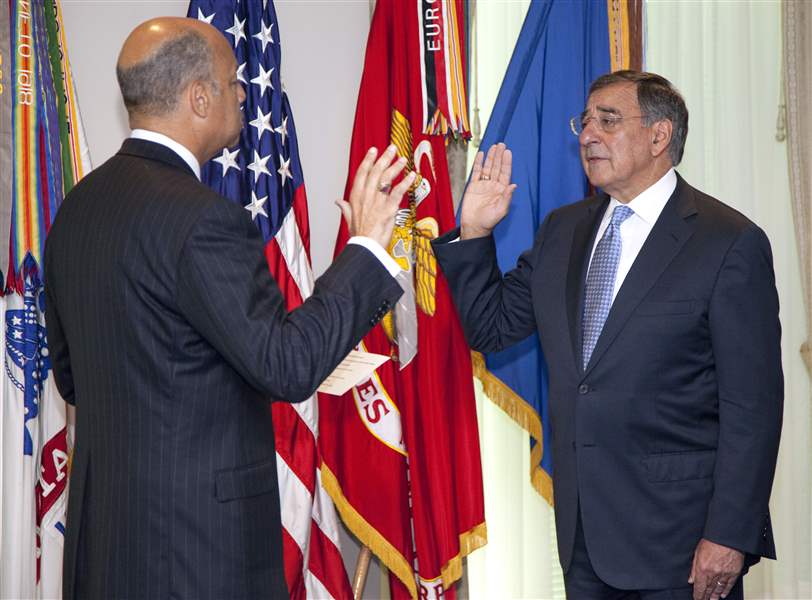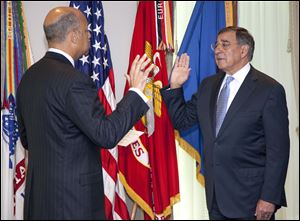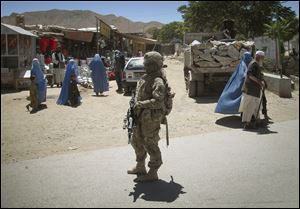
Panetta sworn in as defense secretary, taking over a Pentagon facing myriad problems
7/1/2011
Leon Panetta, right, is sworn is as Defense Secretary by Pentagon General Counsel Jeh Johnson on Friday at the Pentagon.
ASSOCIATED PRESS

Leon Panetta, right, is sworn is as Defense Secretary by Pentagon General Counsel Jeh Johnson on Friday at the Pentagon.
WASHINGTON — A day after stepping down as CIA director, Leon Panetta was sworn in Friday as secretary of defense. He began settling into the job by telling members of the military and their families they are "at the top of my agenda."
He was meeting later with his civilian staff and then with the chiefs of the Army, Navy, Marine Corps and Air Force. He planned to have lunch with Navy Adm. Mike Mullen, chairman of the Joint Chiefs. A spokesman, Doug Wilson, said Panetta intends to work at maintaining close relations with the military at all levels.
Panetta succeeds Robert Gates, who was a Republican holdover from the George W. Bush administration, and is the first Democrat to run the Pentagon since William J. Perry finished his tenure in 1997.
In a nod to Gates, Panetta wrote in a message to all troops and civilian workers at the Defense Department that he intends to emulate his predecessor's role as an advocate for the troops and their families. "I pledge to be the same," he wrote.
Upon arrival at the Potomac River entrance to the Pentagon, Panetta was greeted by his senior military assistant, Marine Lt. Gen. John Kelly, who shook his boss' hand and said, "Welcome aboard, sir." Panetta, briefcase in hand, bounded up the steps and into his 3rd floor office, where he took the oath of office as the nation's 23rd defense secretary.
In his written message, issued moments after his swearing in, Panetta said that in his 2½ years as CIA chief he appreciated the military's capabilities, and he promised that as Pentagon chief he would do all he could to maintain that strength.
"Our nation is at war," he wrote. "We must prevail against our enemies. We will persist in our efforts to disrupt, dismantle and ultimately defeat al-Qaida." He mentioned that his arrival at the Pentagon coincides with the start of a drawdown of U.S. troops in Afghanistan on a schedule announced by Obama last week.
In his message, Panetta also acknowledged the budget problem.
"Even as the United States addresses fiscal challenges at home, there will be no hollow force on my watch," he wrote.

U.S. Army Spc. Natisha LeCount, of Brunswick, Ga., patrols the streets in Pul-e-Alam, the provincial capital of Logar province, south of Kabul, Afghanistan earlier this year.
Panetta served a short stint in the Army in the 1960s but has never worked in the Pentagon.
In size, scope and spending power, the Defense Department dwarfs the CIA. And although Panetta is well-versed in national security issues, the magnitude of challenges that await him at the Pentagon — from the wars in Iraq and Afghanistan to battles inside the defense bureaucracy and conflicts with Congress — is hard to overstate.
After operating behind a wall of secrecy at the CIA, Panetta at the Pentagon will face brighter lights of public scrutiny.
Further complicating the picture for Panetta is the fact that Washington is fast approaching the 2012 presidential election season, as well as the expectation that he may serve only through President Barack Obama's current term. At 73, Panetta is older than any of his predecessors when they began their tenure as defense secretary.
He inherits the task of winding down U.S. involvement in Afghanistan and Iraq while guiding the Obama administration through a stalemated Libya conflict that has stirred up domestic political trouble for Obama. And he walks into an even more immediate problem: new attacks on the Pentagon budget.
"The president has a huge budget crisis going right now, and so literally on Friday when Leon steps into the job he's going to find himself in the middle of negotiations about budgets, and it's going to include defense," said Gordon Adams, who worked for Panetta when he was the White House budget chief in 1993-94.
Gates, who ran the Pentagon for 4½ years, also hands to Panetta the challenge of implementing a repeal of the two-decade-old "don't ask, don't tell" policy that prohibits gays from serving openly in uniform. Preparations within the military for ending the gay ban are said to have gone well, but the historic change carries the potential for disruption or discontent. It will fall to Panetta to manage a smooth transition.
Adams, now a professor of international relations at American University, said Panetta has the advantage of being close to Obama and having enduring friendships on Capitol Hill. He served 16 years in the House, including the last four as chairman of the House Budget Committee.
"Republicans and Democrats alike have always found Panetta very user-friendly," Adams said. "He gets along with people."

Marine Sgt. John Kang attaches the name plate of incoming Defense Secretary Leon Panetta to his office door at the Pentagon.
Sen. Lindsey Graham, R-S.C., has called Panetta a "home run choice" by Obama to succeed Gates. The Senate approved his nomination last week on a 100-0 vote and he was being sworn in at the Pentagon on Friday morning.
Panetta also is well positioned to continue what Gates has called one of his most important bureaucratic accomplishments: a productive relationship with Secretary of State Hillary Rodham Clinton.
State and Defense have a long history of friction, but Gates locked arms with Clinton in an effort to minimize conflict. Panetta already has a longstanding friendship with her, having worked in the Clinton White House while she was first lady.
In 2006 Panetta served alongside Gates on the Iraq Study Group, where he revealed himself to be a skeptic of the war. He urged a U.S. strategy that would bring combat forces out of Iraq and redirect the military's efforts to focus on al-Qaida and training Iraqi security forces. He later called the war "divisive, unstable and dangerous."
On his watch later this year, Panetta may face an Iraqi government request that some of the roughly 47,000 U.S. forces still in the country stay beyond the end of this year, when all U.S. troops are supposed to go home.
Erudite, gregarious and a savvy political operator, Panetta began his public life as a Republican. He served in the Nixon administration as a special assistant to the secretary of Health, Education and Welfare and as director of the U.S. Office of Civil Rights. He switched to the Democratic Party in the 1970s and was first elected to the House in 1976.
Panetta was born in Monterey, Calif., and earned a bachelor of arts degree in political science and a law degree, both from Santa Clara University. He served in the Army as an intelligence officer from 1964 to 1966.
In his farewell speech on the Pentagon's ceremonial parade ground Thursday, Gates joked that Panetta should take a lesson from Gates' example as a former CIA director who arrived at the Pentagon expecting a short tenure.
"My parting advice for Leon," Gates said, "is to get his office just the way he likes it. He may be here longer than he thinks."